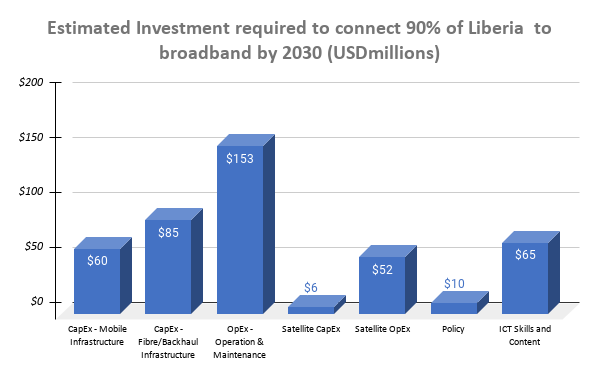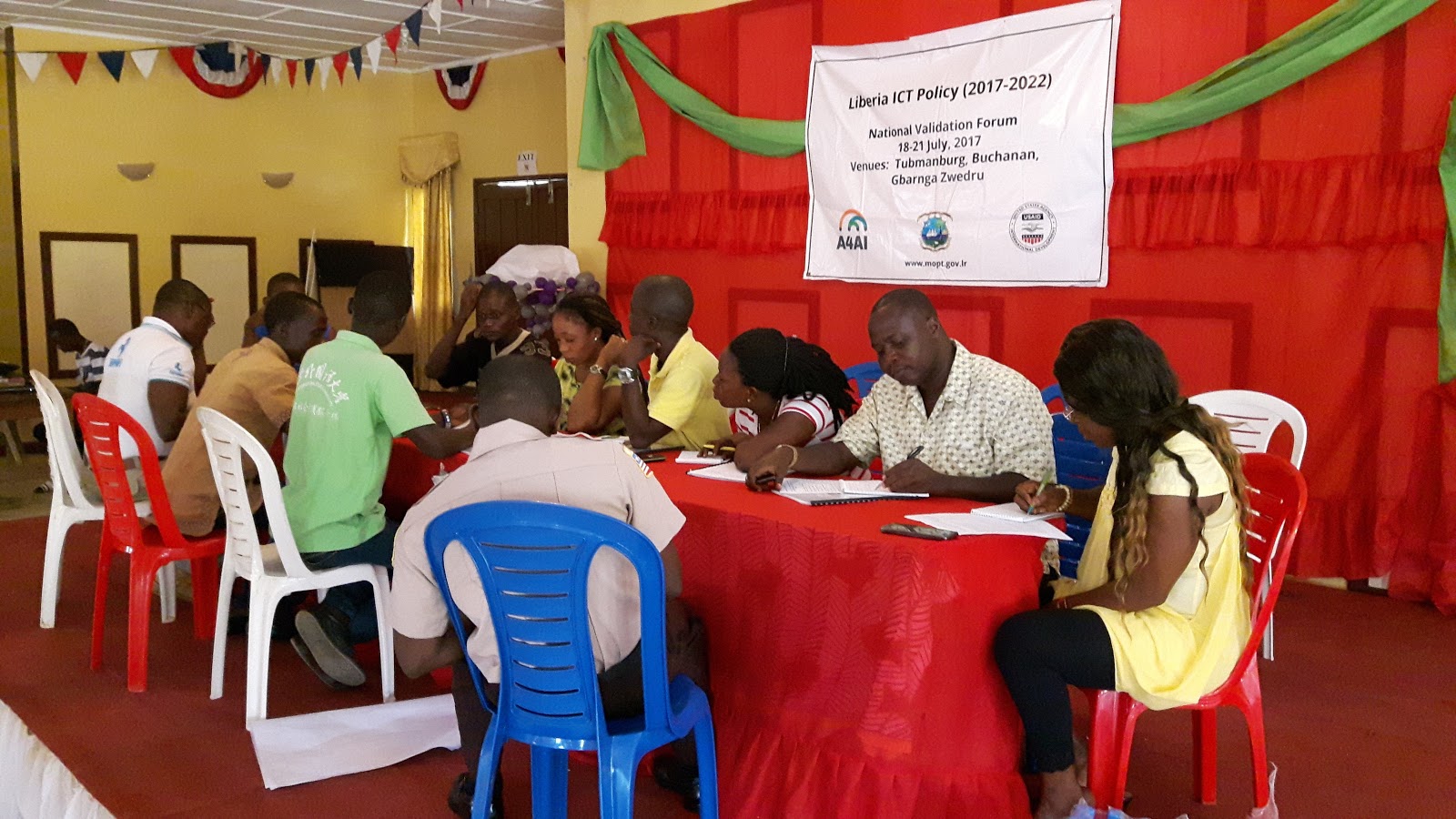This blog was written by Eleanor Sarpong, Deputy Director and Policy lead for A4AI, with contributions by Olutomi Olutola, Regional Connectivity and Digital Advisor USAID. Follow them on Twitter @Ellasarpong and @tomolutola.
Covid-19 has exposed the harmful inequalities in digital access across the globe, cutting citizens off from the full benefits the web offers for education, commerce, and accessing information. In Liberia, which has emerged from civil wars and the Ebola epidemic, the current crisis further risks exacerbating an already wide digital divide, with negative ramifications for the economy. While Liberia has demonstrated its desire to secure universal affordable access in its national ICT policy 2019-2024 launched last year, slow implementation of the policy has hampered any progress. The government must act urgently to bring more of its citizens online.
The state of internet access in Liberia
Internet penetration in Liberia currently stands at 19%. Research from the Alliance for Affordable Internet (A4AI) shows that the country does not meet the UN Broadband Commission’s affordability threshold. While the highest 20% of income earners on average pay 8% of their monthly income for 1GB of data, it costs the lowest 20% of earners a staggering 47.56% to access the same — far above the 2% target.
In Bomi county, 86 km from the capital Monrovia, the proprietor of a training college explained that he and his students can only afford to access the internet on select days of the week:
“We access the internet once a week to download, check information, and send emails because we cannot afford to keep it on all the time.”
His experience falls short of meaningful connectivity — the quality of access we need in place at all times to use the internet’s most powerful features, such as video — and is not uncommon across the country.
In addition to a stark digital divide along income levels, the digital divide also falls along gender lines. Liberia ranks 95th among 100 countries in gender gap in internet access. Men are 49% more likely to use the internet than women. Cost of data and devices and lack of digital skills are two of the most common barriers behind this disparity of internet access and use between women and men.
Despite an increase in the number of internet enabled devices in Liberia, device affordability remains quite prohibitive at 40% of average monthly income. The average Liberian must work for about 13 days to afford the cheapest smartphone in the market according to the latest A4AI research.
In addition to the high cost of access, the quality and reliability of connections is a challenge. Local telecom providers have pointed to the devaluation of the Liberian currency as one of the key factors raising operating costs as most of their network inputs are imported. Against this backdrop, recent government directed increases in data services by the country’s mobile operators risks further leaving consumers out of pocket.
Compared to others within the region, Liberia scores fairly low in its policy progress towards improving the conditions for affordable access and broadband infrastructure, as assessed by A4AI in its annual Affordability Report.
In spite of these hurdles, the country has a great opportunity to close its digital divide — starting with sound, forward looking government policies and a commitment by the public, private sector and civil society stakeholders within the country, to collaborate in developing the ICT sector, particularly in areas outside Monrovia.
New research from A4AI and the ITU found that it will cost the world an additional $428 billion investment to achieve universal internet coverage by 2030. Liberia is projected to need approximately $432 million to increase coverage from 19% of the population today to 90% by 2030, working out to an investment of roughly $36 million every year to meet infrastructure needs, enable policy and regulatory frameworks, and ensure basic digital skills and local content (see Figure 1).

Why the SET the agenda in the ICT Policy 2019-2024 is critical
Investment alone is not enough to ensure universal affordable and meaningful connectivity. A strong national broadband plan makes public spending more effective, encourages private sector investments, and provides greater accountability. All governments need effective broadband plans to bring down costs.
In 2019, Liberian President H.E. Oppong Weah outlined the country’s vision to pursue rapid technology growth in the National ICT policy 2019-2024. The policy is organized around three broad themes — Structure, Empower and Transform (SET) — to develop Liberia into a knowledge and digital economy by 2024 and secure universal affordable internet access. A4AI was honoured to work with the Ministry of Post and Telecoms, the Liberia Telecommunications Authority, Digital Liberia, and other sector Ministries through a collaborative and consultative process supported by USAID to shape this policy. Some of the key policy objectives include:
- Expand ICT infrastructure and establish a national fiber optic backbone to connect all 15 county capitals and cross-border connectivity with reliable links;
- Address last mile challenges to ensure universal access to voice services and broadband, supported by the adoption of infrastructure sharing and dig-once policies and effective use of the Universal Access Fund to meet the needs of underserved,
- Use ICT to drive inclusion of women, marginalized and indigenous groups;
- Enable citizens of Liberia to explore the full use of the broadband services making them a competitive, knowledge driven and well-informed society
To follow through on its ambition to achieve the 1 for 2 affordability target by 2024, the government must take the following actions:
1. Tackle regulation, collaboration, and investment
Regulatory uncertainty is one of the biggest barriers to smart investment. In recent months, mobile operators have been locked in legal battles with the Liberia Telecommunications Authority (LTA) on tariff increases that could drive up internet costs for Liberians. While directly taxing consumers’ data and devices may offer short term revenue gains, research shows it will cause long-term delays to reach universal and affordable connectivity and digital use. There have also been threats by operators to pull out of the market due to challenging investment policies. Should this happen, Liberia risks having a monopoly where consumers have little choice and increased costs to connect. Securing the financing and investment needed to build Liberia’s digital economy requires collaboration with the private sector, and supportive policies are a key component of that relationship. The LTA should also encourage complementary service providers such as community networks to extend connectivity to unserved areas, particularly rural communities. Liberia’s Universal Service Fund, which pools 2% of the annual gross revenue collected from licensed operators, should be used to tackle some of these infrastructure and digital usage gaps.
2. Improve disaggregated data collection and women’s participation online
According to the World Bank, women form almost 50% of Liberia’s population — yet there is insufficient data on how many own a smartphone or use the internet. The national ICT policy offers strategies on how to mainstream gender and women in ICT, notably the need to build the capacity of state institutions to collect disaggregated data. This can guide the development of gender-responsive strategies to realise the objectives for the SET agenda on digital inclusion and close the staggering digital gender gap the country currently faces.

3. Actively push the implementation process
Some aspects of the ICT policy, such as cybersecurity and the ‘dig once’ provisions, have seen some movement toward implementation. But significant progress requires a ‘whole of the government’ approach — starting with establishing a cross-sector implementation working group. This group should have the mandate of the Executive to develop monitoring timelines and the resources needed to coordinate efforts to find funding for the targets.The targets within the SET agenda are ambitious but achievable, provided there is a concerted effort and commitment from all parties.
Covid-19 has shifted so much of our lives online, including public services — further underlining the critical need for affordable, meaningful connectivity and digital skills. If Liberia is to meet the objectives to secure universal, affordable mobile broadband access by 2024, the government will have to be more strategic, collaborative, and open to providing healthy market competition.
For more updates on our work, follow us on Twitter at @a4a_internet and sign up to our newsletter.
